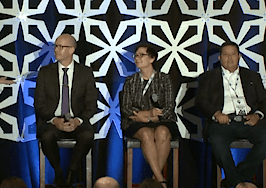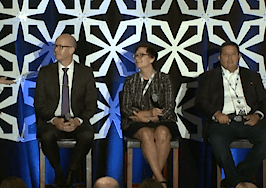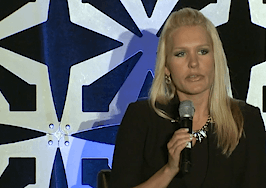What if, instead of 700 or so multiple listing service databases nationwide, there were only one?
It’s an idea that’s floated in the industry for years, but appears to be taking on new urgency as real estate leaders become increasingly impatient with the inefficiencies that come with maintaining and accessing hundreds of separate databases.

Joel Singer
In a livestreamed panel hosted by the California Association of Realtors (C.A.R.) Wednesday, C.A.R. CEO Joel Singer asked a dozen industry leaders if “a standards-based national backend” should be the industry’s goal “because it’s technically possible and also by definition it’s the most efficient, isn’t it?”
None disagreed with Singer and Mark McLaughlin, CEO of prominent brokerage Pacific Union, was quick to say, “That is the goal. It is in process.”
Singer replied, “Well, it’s in process in several ways, right? Within the MLS system and outside the MLS system and that’s the message for those of us inside organized real estate.”
It’s no secret that off-MLS platforms have proliferated in recent years and tech startups that eschew the MLS are garnering millions in venture capital.
Broker frustrations with data efficiency and control also led to the creation of Upstream, a broker data platform that was to be the starting point for listing data and would distribute it wherever a broker desired, supplanting a role many MLSs currently play.
Upstream is behind schedule and has yet to launch, but that has not deterred support from its broker backers, including McLaughlin who is an Upstream board member. “If it takes another five years to get Upstream up and running, we will be there every year writing a check to keep it going,” he said.

Mark McLaughlin
Pacific Union, which has about 1,800 agents and brokers, participates in 12 different MLSs.
“We are constantly pushing the envelope to find alternatives to the MLS to deliver information to our clients,” McLaughlin said. “I think in an industry where the brokerage community owns the data and also, generally speaking, is the revenue stream to the MLSs, that the MLSs have to be far more responsive … and until that happens we will continue to look for alternatives to the MLS.”
For many on the panel, the solution to at least some broker pain points would be the formation of a national MLS database that any number of tools and “front ends” (user interfaces) could plug into. A national database would not necessarily mean a national MLS, according to panelists.

Craig Cheatham
“We ask our brokers how many MLSs should there be; they don’t say one,” said Craig Cheatham of brokerage network The Realty Alliance and an Upstream board member. “They don’t say 10. They say somewhere between 50 and 250.”
Brokers are aware of local differences, and generally, “they love their MLS,” Cheatham said.
Singer said he thought a national database “is very long in the future because of the politics.”
But David Silver-Westrick of Keller Williams OC Coastal Realty said, “I think to solve this problem we need another moonshot approach to building a national database. There has to be kind of an existential sense that unless we get this done right now, we won’t be here five years from now.”
Wes Burk, broker-owner of Patterson Realty, agreed. “I don’t know if [MLS] consolidation will get us there in time.”

Art Carter
Art Carter, CEO of California Regional MLS (CRMLS) which has had a statewide MLS initiative for years, told panelists that California could have a statewide database in three months if the will was there.
David Charron, chief strategy officer for one-year-old Bright MLS, added, “There are no technical challenges in doing this. It’s really human and political factors that stand in the way of greater cooperation and consolidation.”

David Charron
But in regards to the broker challenges broker panelists referred to — including access to their own data from MLSs — Charron urged brokers to call out the specific MLSs that don’t provide the data rather than generalizing complaints to MLSs in general.
Acknowledging the point, Cheatham credited the 200 MLSs “that are doing a good job,” noting that the other 500 MLSs, who are often smaller and have fewer resources and staff, should be brought to the table. He suggested state Realtor associations could bring together various industry players — including the 500 smallest MLSs.
“It can’t [just] be the superstars of the MLS world” that participate in conversations about the future of the MLS, Cheatham said.
Carter agreed, citing the old adage: “You can bring a horse to water, but you can’t make him drink.”
“The corollary to that is ‘You can salt the oats,'” he said. According to Carter, the way to do that is for MLSs to become more aggressive.
“Consolidate with the willing. Data share with the unwilling to consolidate. And go around those willing to do neither,” Carter said.
MLSs wishing to merge should put pressure on their brokers and communicate the benefits of merging to their agents, he said.
Some panelists emphasized that consolidation and a national database won’t solve all broker challenges, including the need for uniform data licensing agreements to make it easier for brokers and tech vendors to access data for broker and agent tools.
MLSs also need to not only provide data, panelists said, but offer it in a way that helps agents and brokers show their value to consumers beyond bed and bath counts.
Michael Wurzer, CEO of MLS system vendor FBS, later opined that a national database would be “anti-competitive, slow-moving, bad technologically, and generally impractical.”
Despite a prevailing sense from the speakers during the session that the status quo was not acceptable, the livestream concluded without panelists agreeing to collaborate on any concrete plan of action, nor any declared follow-up meeting to discuss such.
C.A.R. will release a report on reinventing the MLS later this month.













